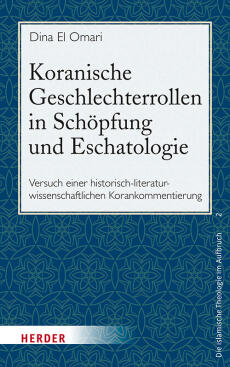In the Quran, men and women are equal
Islamic theologian Dina El Omari presents first comprehensive feminist exegesis of the Quran – “Quran is a text of its time” – Illuminates patriarchal verses within their historical context – Equal instead of hierarchical creation of the first human couple – “Women in Paradise are equal partners” – Podcast episode 12
Press release 31 May 2022
According to new scientific findings, the Quran shows a far more equal picture of women and men than traditional interpretations might suggest. “Detached from their historical context, some Quranic verses may well be degrading to women. Traditional exegesis often has such an ahistorical understanding and thus justifies patriarchal structures to this day”, says Islamic theologian Prof. Dr. Dina El Omari from the University of Münster’s Cluster of Excellence “Religion and Politics”. “A feminist interpretation, on the other hand, reads the Quran in the context of its time, thereby yielding a contemporary understanding of the text and image of women”. One example is the story of creation: “God creates the first human couple at the same time, not man before woman. Also, the women in Paradise are to be understood as equal partners, not, as the traditional interpretation would have them, passive playmates”, she continues. El Omari has recently published with Herder-Verlag the first comprehensive feminist exegesis of the Quran. The postdoctoral thesis is called Quranic Gender Roles in Creation and Eschatology.

“Traditional currents often interpret the Quran as the direct and timeless word of God, which is why the scripture has only been interpreted literally”, says El Omari. “Feminist exegesis also assumes a word from God, but sees the Quran in the context of late Arab antiquity and its patriarchal social structures”. She also draws on texts from late antiquity, some of which are echoed in the Quran. “In this light, it is impossible to uphold interpretations that devalue women, that see man as having been superior to woman since creation”. Rather, this reading can highlight Quranic verses, long ignored by many conservative currents, that stress the equal value of man and woman. “The language of many verses is undoubtedly male-dominated. An exegesis that emphasizes gender equality does not ignore this, but analyzes the historical and literary background against which such patriarchal tendencies arose. This shows that Islam and feminism are compatible”, El Omari argues. “The actual message of the text should be detached from the patriarchal framework, so that divine justice becomes clear and open to further interpretation”.
Feminist exegesis of the Quran as reaction to Islamism
Feminist exegesis of the Quran emerged in the 1970s as a reaction to Islamist movements such as the Muslim Brotherhood, which reduce women to the roles of mother and wife and curtail their right to education, for example, as the Taliban are currently doing in Afghanistan. “The internationally widespread literal interpretation of the Quran regards traditional patriarchal readings as unquestionably authoritative. Such currents block an understanding of the text from today’s life worlds”, says El Omari in the Cluster of Excellence’s research podcast and in its annual theme “Tradition(s)”, which sheds light on changes to traditions.
Women in Paradise: First demure and beautiful, then equal partners
Already appearing in the early verses, the first women in the Quran, besides the creation of the two sexes, are the women of Paradise. “Here they are described as beautiful, demure, and largely passive. In later verses, though, they are equal partners”, says El Omari. Thus, the Quran, which according to Islamic belief took 23 years to be transmitted to the Prophet Muhammad, introduces equality gradually: “It remains unclear here whether the woman keeps the man company in the hereafter, or vice versa. Contrary to traditional readings, there is no mention of the woman’s sexual availability”.

El Omari explains the change in the picture of the woman in the Quran from the historical context, which also changed: “The fact that it is men whom the tradition addresses at the beginning results from the patriarchal structures in Muhammad’s environment. Women were most likely not the direct addressees in the beginning”, she says. But the principle of equality unfolds in later verses in the motif of sociability: “For example, in eschatology, the message of the reward of a godly life after death is conveyed in such a way that the woman awaits the man in the afterlife”. This inverts a familiar motif of Arabic poetry, in which the abandoned husband mourns for his wife. “Against this background, the prospect of companionship and equal partnership is a logical reward”.
Cosmic order shaped by harmony
As El Omari explains, the story of creation and eschatology, which addresses questions about the afterlife, have always been the focus of interpretation as elementary themes of the Quran and are also central to gender issues. “The verse ‘We created you from one being and from him a partner’ (4:1) is often interpreted by traditional exegesis as the creation of Eve from Adam, the former therefore being inferior to man”. Linguistic analysis of all 15 verses on creation, however, shows: “God created the human being and the human being’s partner-entity (Arab. zawǧ, grammatically male) simultaneously from a single entity (Arab. nafs, grammatically female)”. The exegete Razi (1149-1209) already pointed out that the verse does not mean “from him”, but “of the same kind”, explains El Omari. Man and woman are thus equal partners in creation.
“The fact that the first human beings in the Quran come into being at the same time, and that the assignment of gender remains linguistically unclear, shows the divine principle of symmetry that recurs in the Quran”, she explains. This cosmic order shaped by harmony is also reflected in gender equality. “Here, the Quran takes up ideas from late antiquity of a hierarchy-free creation, something that also occurs in Jewish writings”. (apo/vvm)

